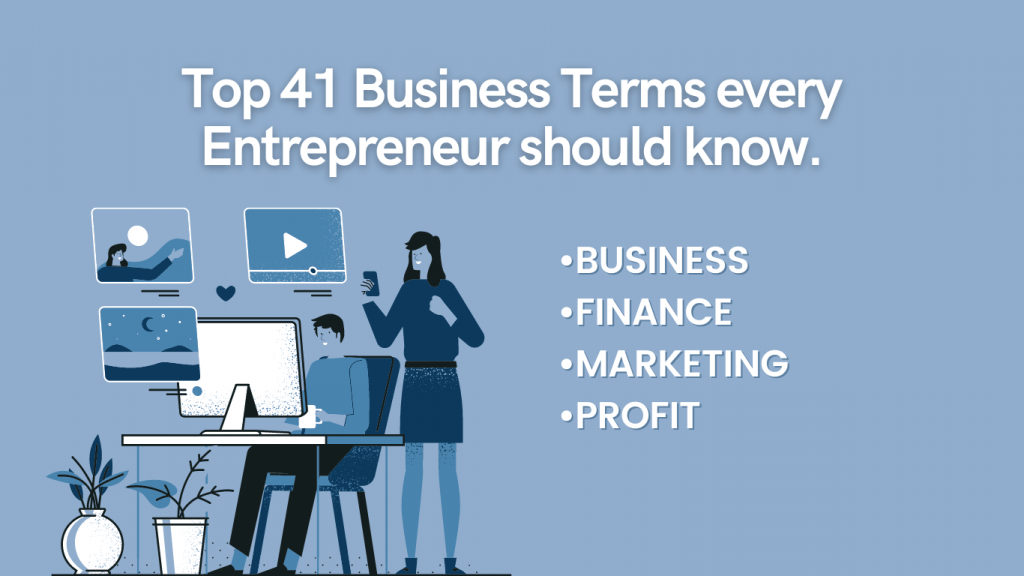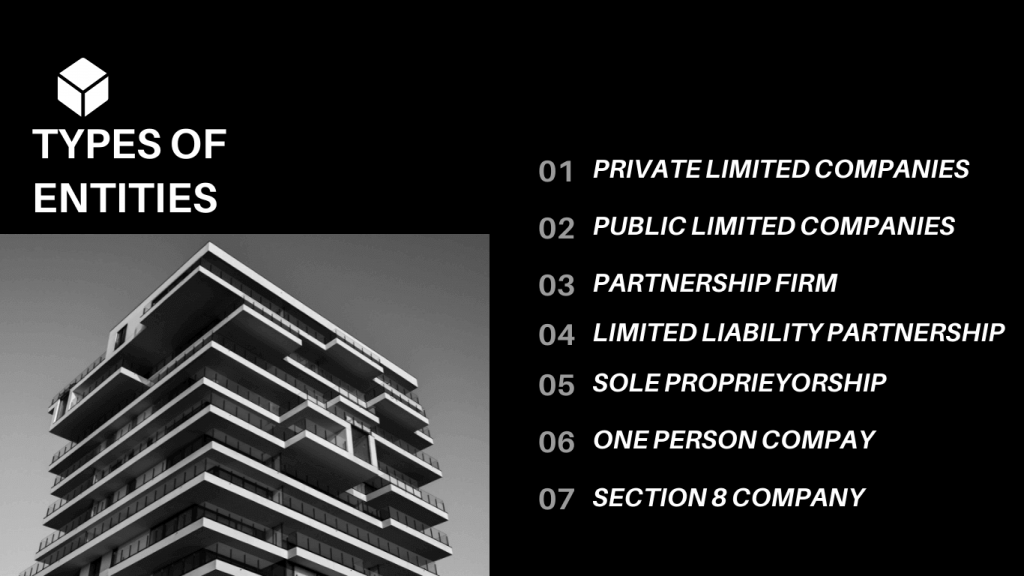If you are a student, entrepreneur, or wantrepreneur interested in starting your own business or have already started, there are some business terms that you should know to make your journey hustle-free.
You are absolutely at the right place to learn the Business Glossary. But first, let me explain: What is a Business Glossary? We can say that the Business Glossary is a vocabulary of Important Business Terms and definitions.

In this article business terms are explained in a very easy language, so that learners get more effective knowledge. Let’s dive into the business glossary which is the collection of Top 41 Business Terms you should know.
- Balance Sheet
- Audit
- Venture Capital
- Marketing
- Cash Flow
- Benchmarking
- SWOT
- KPI
- Performance Review
- R&D
- Scalable
- Core Competency
- Sole Proprietorship
- One Person Company
- Private Limited Companies
- Public Limited Company
- Partnership Firm
- Limited Liability Partnership
- Section 8 Company
- Depreciation
- Revenue
- Variable Cost
- Fixed Cost
- Diversification
- Incentive
- Profit Margin
- Gross Margin
- ROI
- ROA
- USP
- Niche Market
- Inbound Marketing
- Outbound Marketing
- Brand
- D2C
- B2C
- B2B
- B2G
- IPO
- Stake / Equity
- Valuation
- Conclusion
Balance Sheet
A balance sheet is a snapshot of a company’s finances, assets, liabilities, and shareholder equity.
Audit
An audit reviews your business’s financial records to verify their accuracy by looking at things like financial transactions and ledger accounts.
Venture Capital
Venture Capitalists are usually the investors and investment banks who invest in those Startups which have the potential to scale. This investment is called Venture Capital.
Marketing
Marketing is the process of advertising or promoting a business or product in the best possible way.
Cash Flow
The actual cash flow of a company is the movement of the money that is earned and spent by the company.
Benchmarking
A Benchmark is a standard and Benchmarking is a process by which the measurement of our system is done in various aspects.
SWOT
SWOT analysis is a process of understanding the competitive position of an individual or organization in terms of Strengths, Weaknesses, Opportunities, and Threats.
KPI
KPI is the short form of Key Performance Indicators. KPI is a measurement of the performance of any organization in its particular field.
Performance Review
Revisiting the work done by any employee by the manager is called a Performance Review.
R&D
Research and Development (R&D), is the process, by which more profit can be earned by making the product better.
Scalable
A business is said to be scalable when it has the potential to grow more.
Core Competency
A Core Competency is the capability to distinguish your company or product from the competitors.

Sole Proprietorship
Sole Proprietorship is the simplest form of business that is owned by an individual.
One Person Company
One Person Company is a Good business type for such entrepreneurs who want to do their business themselves without any partner.
Private Limited Companies
Companies that are registered as private entities and a group of people involved as shareholders are Private Limited Companies. Such companies do not publicize their shares. Private Limited Companies is abbreviated as Pvt.
Public Limited Company
When Private Limited Companies launch their IPO it becomes Public Limited Companies. i.e. shares of a Public Limited Company can be purchased by the general public.
Partnership Firm
When a business has one or more partners (fewer than ten) together they are called partnership firms but all the partners must have signed the registered partnership deed.
Limited Liability Partnership
Limited Liability Partnership (LLP) is a separate legal entity, it is a partnership in which the partners of the company have limited liability. The partners are not liable for the acts of each other and can be held liable only for their own acts.
Section 8 Company
Section 8 companies are registered as NPO (Non-Profit Organisations), their main motives are to promote education, charity, sports, science, research, social welfare etcetera.
Depreciation
Depreciation is the reduction of the cost of a tangible or physical asset over time.
Revenue
Revenue is the net income of a company, also referred to as turnover.
Variable Cost
Variable Cost is the expenses of any entity which directly depends on the production. Variable cost increases as production/sales increases whereas variable cost decreases when production or sales decreases.
Fixed Cost
Fixed Cost does not depend on the production or sales, it remains the same.
Diversification
Investing in different assets instead of one is diversification.
Incentive
The incentive is something in the form of a bonus or any other price that motivates an employee or worker to do a better job.

Profit Margin
Profit margin is the ratio of a company’s net profit (income minus all costs) divided by its revenue. It is always defined in the form of a percentage.
Profit Margin = (Total Income – Costs) / Revenue
Gross Margin
Gross margin is the difference between revenue and cost of goods sold, divided by revenue.
Gross Margin = Revenue – COGS/ revenue
*COGS – Cost of Goods Sold.
ROI
ROI stands for Return on Investment. It is used as a performance measure, calculated by dividing net income by the investment.
ROA
ROA (Return of Assets) refers to the financial ratio of the company’s net income and its average total assets.
ROA = Net Income/ average total assets.
USP
How you are different from your competitors is USP (Unique Selling Proposition). It could be any factor that makes your business different from others.
Niche Market
A niche market is a specific segment of a large market, which may be specific to its product type, consumer, etcetera.
Inbound Marketing
Inbound marketing is a marketing tactic that is used by providing valuable content. For example, YouTubers make sponsor videos, the way they plug the product into the video is known as Inbound Marketing.
Outbound Marketing
Outbound marketing is a marketing tactic that interrupts your audience by the content they always do not want to consume. For example, An ad appears while watching a video on YouTube.
Brand
A brand is a name or identity of a product made by a company.
D2C
D2C is the abbreviation of Direct-to-Consumer. According to its name, it is a model of business in which products are directly sold out to the consumers without any involvement of wholesalers.
B2C
B2C is the abbreviation of Business-to-Consumer. In the B2C model of business the product can be sold out directly or by retailer.
Note: All D2C is B2C but not all B2C is D2C.
B2B
B2B is the abbreviation of Business-to-Business. Rather than business to the consumer it is the exchange of products between Businesses.
B2G
B2G is the abbreviation of Business-to-Government. It is the model of business in which products are sold out to the government of states, government agencies, and government institutes.
IPO
An Initial Public Offering (IPO) is the first sale of shares by a private business entity to the public.
Stake / Equity
Equity or stake is a part of a company that you buy in the exchange of money to take the advantage of future gains of that company.
Valuation
Valuation is the present economic value of a company or business entity.
Conclusion
Hope this Business Glossary that contains 41 important business terms were helpful for you. If we missed any important term then please let us know by your valuable comments.





